Tag: abnormal load

Wind turbine transport: a comprehensive guide
With the need for renewable energy sources growing, the number of wind turbines is increasing every year.
But have you ever wondered how wind turbines are transported to wind farm sites?
Keep reading as we break down everything you need to know about wind turbine transportation.
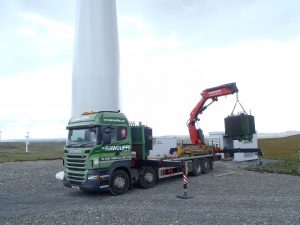
What is a wind turbine?
A wind turbine is an excellent way to convert kinetic energy, in the form of wind, into electricity.
Turbines consist of three blades, which turn in the breeze, and create power using a generator. This is sometimes referred to as wind energy or wind power, and you can often spot them on land or in water.
Wind turbines are hugely popular as they’re a renewable source of energy, offering a more eco-friendly alternative to fossil fuels.
How do you transport a wind turbine to a wind farm site?
Wind turbines are often produced abroad and therefore require meticulously planned haulage.
On the road, they’re classified as heavy haulage, more specifically, abnormal load haulage.
What is abnormal haulage?
An abnormal load is often more than 2.9m wide or weighs more than 44,000kg. It also typically can’t be broken down into smaller pieces, or 2 or more loads without causing damage.
Wind turbines are so large and indivisible that they might not be able to fit on certain narrow roads or low bridges. Moving such huge machinery calls for careful planning, and you may even need to contact the authorities to ensure safety. It’s also essential that you comply with government rules and regulations.
Because of these unique factors, they can’t be transported using normal vehicles. This requires professional haulage fleets, specialised equipment, and experts.

How much does it cost?
Transporting such complicated freight can vary greatly in costs. Factors like distance, destination, the number of vehicles needed, the company you use, and what’s being transported can all affect the cost of haulage services.
Every project is different, so if you need a personalised quote, you can get in touch with the experts.
How big are turbine components?
Turbine components can massively differ in size, with wind turbine blades ranging anywhere from 0.5 to 15 metres long.
The average height of wind turbines and their separate components, like blades, is also increasing, which is projected to continue due to larger turbines generating much more energy. Because of this, size often varies on a case-by-case basis.

Why choose JB Rawcliffe when transporting wind turbines?
Here at JB Rawcliffe, we’re specialists in haulage services. Over the past 45 years, our projects have supported a range of industries including the construction, defence, marine, industrial, shipping, oil, and gas sectors.
We’re also proficient in a range of services across the UK, including abnormal load transport, heavy goods storage, machinery and cargo handling, and vehicle accident salvage and recovery.
Route planning when transporting such complex freight can be a minefield, which is why our team will take the reins on your project’s logistics, meticulously planning and fine-tuning every detail for you.
So, if you’re in need of friendly and professional haulage services from a knowledgeable team, get in touch with us today.
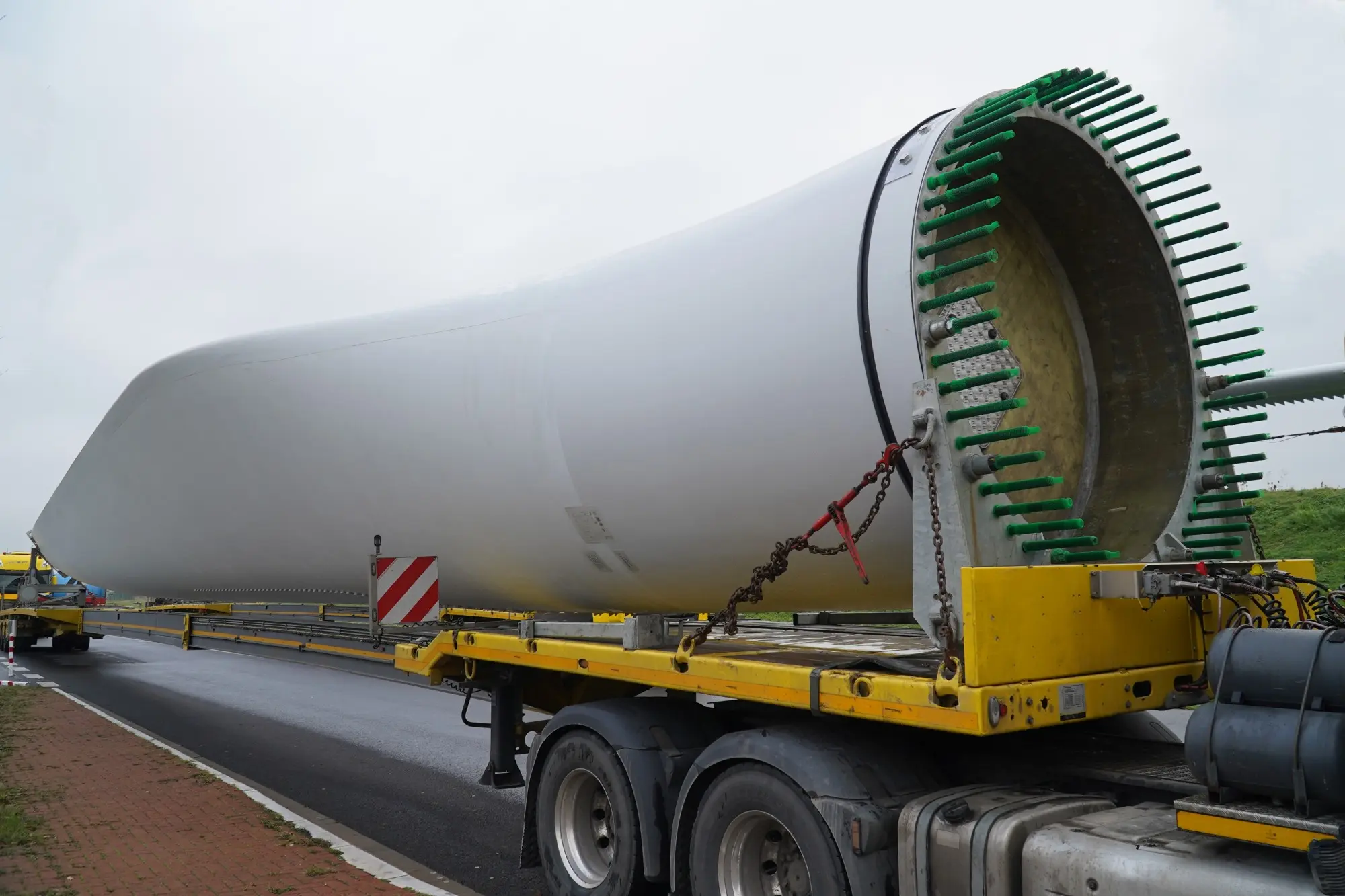
How much does it cost to transport an abnormal load?
If you need to transport heavy or indivisible goods, it might be difficult to even know where to start.
From navigating regulations from the highway authorities to the physical transportation itself, JB Rawcliffe is a heavy haulage company that can guide you through every step.
Read on to learn more about abnormal loads, their costs and factors that may affect this.
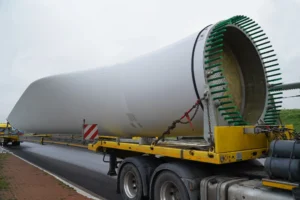
What is an abnormal load?
In the UK, dimensions that categorise abnormal haulage are set out in the Construction & Use and Authorised Weight regulations.
An abnormal load refers to any heavy load that weighs over 44000 kg (or 43.3 tonnes), has an axle load of 10,000 kg for a single non-driving axle, or 11,500 kg for a single driving axle.
It can also include any goods that are over 2.9 metres wide or have a rigid length of over 18.65 metres (61 feet).
Due to these large dimensions, an abnormal load is typically unsafe to be carried by a standard goods vehicle and requires specialist transportation.
Examples of abnormal loads can include “abnormal indivisible loads”, which refer to large goods that can’t be divided and separated, such as trains, motorhomes, or huge pieces of industrial equipment.
When moving abnormal loads, the road and bridge authorities must be notified and sometimes even the police. Many abnormal loads therefore require specialist trailers, or other forms of specialist equipment, for a successful transit.
Because of this, opting to work with a reliable and trustworthy private escort vehicle service can ensure that you have a hassle-free haulage experience.
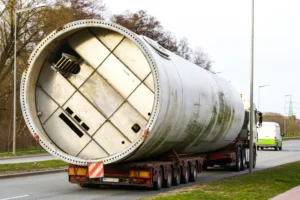
How much is an abnormal load transport?
The cost of abnormal load transportation can vary on a case-by-case basis.
Due to the added dangers and complexities that come with abnormal load transports, prices can be more expensive than regular haulage services.
Typically in the UK, no two haulage companies or projects are the same.
Deciding factors typically include:
- The type of haulage (including size and weight)
- The length and complexity of the journey
At JB Rawcliffe, we offer abnormal load haulage at competitive rates without compromising on service.
For a tailored quote specific to your project’s requirements, you can contact us today!
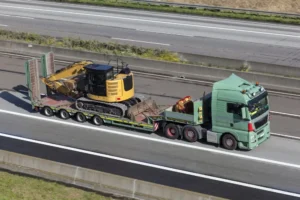
Why choose JB Rawcliffe?
Here at JB Rawcliffe, we have over 45 years of experience in professionally transporting goods throughout the UK. Today, we’re a leading heavy haulage service.
We offer a bespoke service, which means that our solutions are tailored to the requirements of our clients, so whatever goods you require to be transported, we’re here to help.
Our extensive list of accreditations and gleaming reviews speak for themselves. We’re renowned for our positive attitudes, stellar communication and competency towards each one of our abnormal load transport projects.
When you choose JB Rawcliffe, you can focus on your project and minimise hassle while we organise the entire haulage process for you.
Get in touch
Ready to discover outstanding abnormal load movements for your next project? Get in touch with one of our friendly experts today for more information or a quote.
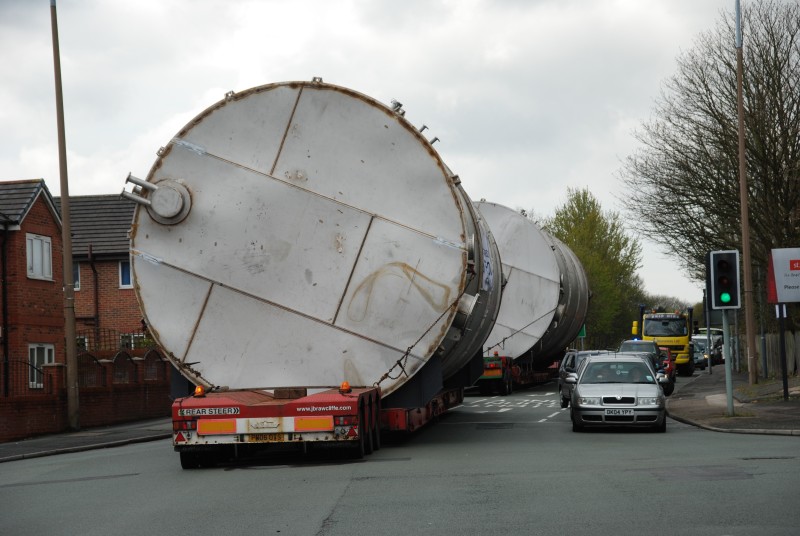
How Do Transport Companies Plan Routes For Abnormal Loads?
Every day, transport and logistics companies are seeking ways to improve the efficiency of their routes and schedules, especially with the rising fuel costs.
Whilst it’s crucial that hauliers have a fleet of specialist vehicles at their disposal – ready to be dispatched at a moment’s notice – they also need to determine a suitable hauling method for oversized (abnormal) loads.
Taking the time to plan and execute the logistics for abnormal load transport will ensure goods reach their end destination safely and on time. However, there are a few factors that need to be considered when it comes to route planning.
Let’s take a closer look at these.
What type of load needs moving?
To identify the best truck for the job, haulage companies need to assess the shape, size and weight of the load that needs moving.
Armed with the basics, they can then decide on a suitable route to take – making sure there are no obstructions (i.e. low bridges, narrow streets, parked cars, etc.) along the way. This will ultimately ensure the safety of your cargo, the driver, other road users and pedestrians.
When does the load need to be moved?
Whether you need to transport goods within the UK or to destinations overseas, it’s a sensible idea to consider the time of year.
For example, if you need to move machinery in December – ready for the new year – bear in mind that the roads will be much busier as people travel home to spend the festivities with their loved ones.
Similarly, when transporting an abnormal load in adverse weather conditions, hauliers are likely to drive slower and take more frequent breaks, especially when making long journeys. Taking additional precautions, as such, is likely to increase the time it takes for goods to arrive, but the risk of accidents and injuries will be significantly less.
Is a vehicle escort required?
Depending on the type of load you need to move, you may need to notify the police, highway authorities and bridge and structure owners.
Although a vehicle escort is not compulsory for abnormal load transport, when planning the route and executing the logistics, your chosen haulage company may recommend using an escort service.
Escort vehicles can either ride ahead to ensure the route is safe for the long or wide vehicle, or behind to help control passing traffic. Either way, they will alert other road users to the presence of an abnormally large load.
Make JB Rawcliffe your first choice today
Whether you need to move heavy, industrial machinery or portacabins that are too wide to fit on a conventional lorry, JB Rawcliffe can handle it all!
We have specialised in abnormal load transport for many years and guarantee a professional solution for all clients. We use only the most reliable vehicles to transport unusually large loads across the country and beyond.
Our team will always conduct a route survey to ensure it’s safe for your goods to be transported. And when planning the route for abnormal loads, we can arrange a private escort service, if necessary.
To find out more about the services we provide and what’s involved in route planning, give us a call on 01695 737 880.
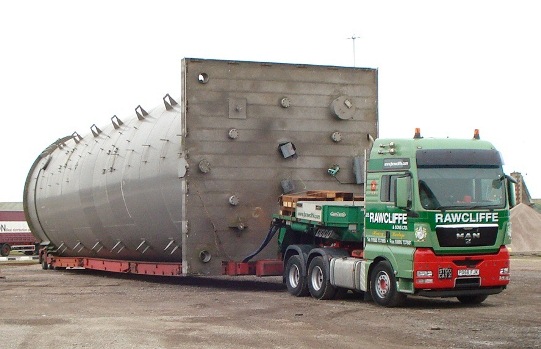
Benefits Of Using Vehicle Escort Service For Abnormal Load Transport
Do you need to transport an abnormal load?
Whether it be a train carriage to a railway station, a new aircraft to the airport or an industrial machine to a factory, the team at JB Rawcliffe & Sons can help.
As a leading transport company in the UK, we will make sure that your load reaches its end destination safely and on time.
But the question is, do you need to take advantage of a vehicle escort service?
Let’s take a closer look at the importance of escort vehicles for abnormal load transport and their benefits.
What is an escort vehicle?
An escort vehicle often rides ahead of the vehicle transporting the load to check the route is suitable. However, in some cases, it may drive behind to control passing traffic – ensuring they give a wide berth when overtaking.
The purpose of a vehicle escort is twofold. It alerts road users to the presence of an abnormally large load so they can adjust their speed accordingly – reducing the risk of accidents – and allows the driver to navigate the route in the safest way possible.
Most escort vehicles are equipped with flashing beacons and they can drive for help or raise the alarm in an emergency.
Is a vehicle escort strictly necessary?
Abnormal loads don’t always need to be escorted. However, depending on the load you’re transporting and the route it will take, the police force and local authorities may suggest otherwise.
Arranging a private escort for your abnormal load will help to keep your goods that little bit safer, which is especially ideal if they need to be transported on busy motorways or areas with restrictions such as overhead cables, low bridges, narrow streets or parked cars.
3 reasons to use an escort for abnormal load transport
- Alert other road users – sometimes, it’s not always obvious that a vehicle is carrying an abnormal load. For example, it may hang slightly over into the second lane on the motorway or be slow-moving.
Without an escort, passing motorists can easily misjudge the space available and collide with it, causing damage to the load itself and/or the vehicle transporting it – not to mention damage to their own vehicle.
- An extra pair of eyes and hands – whether it be to identify potential challenges along the way, seek help in an emergency or stay with the load until assistance arrives, having a trained and experienced person close behind or just ahead can be a real boon.
When the load arrives at its destination, it’s also helpful to have an extra pair of hands to help with loading and unloading the goods – especially if they’re fragile or difficult to handle.
- Seek approval faster – often, the police and authorities will look favourably on your route if you take advantage of a vehicle escort service. This is because you reduce the risk of accidents and injuries by making sure the route is carefully planned out – factoring in any potential challenges or obstacles on the way.
Arranging for your abnormal load to be escorted will give you the peace of mind that it will reach its destination safely and efficiently too.
Contact JB Rawcliffe & Sons to find out more about abnormal loads
Here at JB Rawcliffe, our team are experts in abnormal load transport and will ensure that every aspect is taken care of properly.
We will work closely with you to establish the most suitable haulage solution for your needs – taking into account the goods you need to transport and your timescale.
To discuss your requirements in more detail with the team, and reap the benefit of a private vehicle escort service for abnormal load transport, give us a call on 01695 737 880 or email enquiries@jbrawcliffe.com.
Benefits Of Using Vehicle Transfer For Abnormal Loads FAQs
Yes, a vehicle escort is provided if required as part of our heavy haulage service, meaning you won’t have to hire an escort vehicle separately.
Our private escorts ensure other road users are alerted to the presence of a slow-moving load, make sure the driver is aware of tight bends and is on hand to call for help in the unlikely case that an accident occurs.
Not all abnormal loads require a vehicle escort to get from A to B safely – we will use the size requirements outlined by National Highways to determine if your abnormal load requires a private escort.
Loads below 4.12m wide, 30m long and 100 tonnes don’t legally require an escort vehicle.
We have over 45 years of invaluable experience planning vehicle escort routes and executing safe heavy haulage transportation - so you can be sure your load is in safe and knowledgeable hands.
Over this time, we have planned vehicle escorts for loads of all shapes and sizes that have reached their destination safely and securely.
The safety of our drivers, other road users and your load is incredibly important to us - this is why we rigorously plan all our routes.
We perform load movements according to the official guidelines for escort vehicles set out by National Highways, the body responsible for maintaining our roads.
For example, all our vehicles meet the lighting and signage requirements outlined in the code of practice.
JB Rawcliffe will notify local authorities and police forces that an abnormal load is being transported, increasing the likelihood that the haul gets approved.
There are several compelling reasons why you need an escort vehicle whilst hauling heavy loads across public roads.
1. Escort vehicles alert road users to the presence of a slow-moving abnormal load, reducing the chances of accidents - motorists can adjust their speed in plenty of time and are less likely to overtake dangerously on tighter country roads.
2. If an accident occurs, the escort convoy can raise the alarm and call for help if the lorry driver is hurt.
Whilst waiting, they can stay with the vehicle protecting the load and alerting other road users to the upcoming obstacle by placing cones.
3. Escort vehicles alert the load driver to upcoming dangers that must be approached carefully, such as tight and sharp bends. The vehicle also alerts oncoming traffic to the upcoming lorry with a flashing amber light, meaning they can approach cautiously.
4. Using a vehicle escort demonstrates responsibility and commitment to the safety of other road users to police forces and local authorities that are more likely to approve the haul.
It’s a legal requirement to have an escort vehicle if abnormal loads exceed particular dimensions and weights.
National Highways code of practice states that if an abnormal load meets the following criteria, it will require a vehicle escort;
• If the vehicle or load width exceeds 4.1m for roads and 4.6m for motorways, it requires an escort vehicle.
• Loads reaching 30.5m long will need a vehicle escort, except on motorways.
• If vehicle gross weight exceeds 100 tonnes for roads and 130 tonnes for motorways.
Police forces have the right to vary these measurements and have the final say on whether a load requires an escort vehicle.
For further information regarding our abnormal load transport services, feel free to call us on 01695 737880 or email us at enquiries@jbrawcliffe.com
